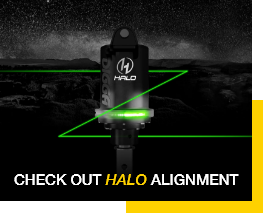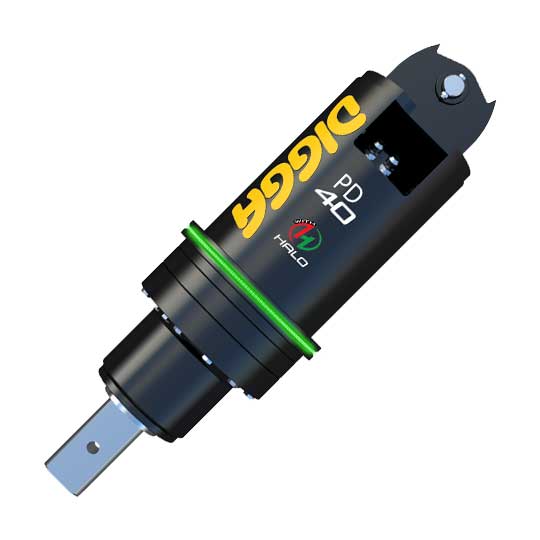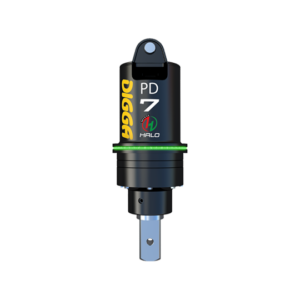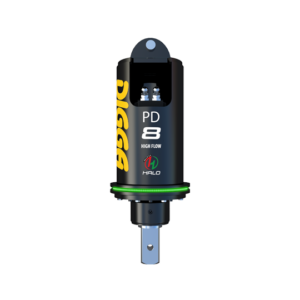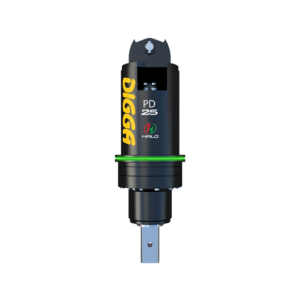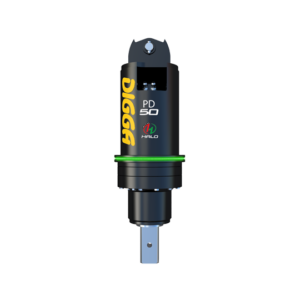
PD40 Earth Drill
The future of drilling
Digga’s PD40 Earth Drill is designed for excavators up to 27 tonnes with flows between 120-230 lpm, and form a comprehensive portfolio for the foundation boring, post hole drilling, horizontal boring and utility markets. Its innovative gearbox design allows for maximum drilling depth without extensions, reducing downtime and maintenance. Featuring a Digga/Danfoss bell motor for reliable performance in various ground conditions, the PD40 is backed by an industry-leading warranty and European manufacturing.
Speeds
Halo Alignment System
Machine Suitability
Ideal Use
Warranty
Jump to:
Specifications
Jump to:
Operator’s Manuals
Jump to:
About Auger Drives
Jump to:
FAQs
Features
Efficient. Danfoss bell motor.
Compact & Powerful. This drive is both incredibly compact and remarkably powerful, delivering exceptional performance and impressive output torque for its size, ensuring optimal efficiency and reliability for demanding tasks.
Lifetime Shaft Pull-out Warranty. Equipped with in-house designed, & manufactured shaft locking nut, this system is guaranteed to prevent shaft pull-out.
Built Tough. Digga gearboxes are built to last, renowned for their quality, dependability, and a legacy of trusted performance spanning over four decades. Crafted with precision-machined gears, delivering outstanding performance, reliability, and an excellent return on investment.
Halo: The perfect drilling partner
Its intuitive operation ensures impressive results, delivering more accurate boreholes and minimising costly hole oversizing. With Halo, you can achieve exceptional returns on your investment and maximise project efficiency. Halo is an indispensable tool for modern drilling operations.
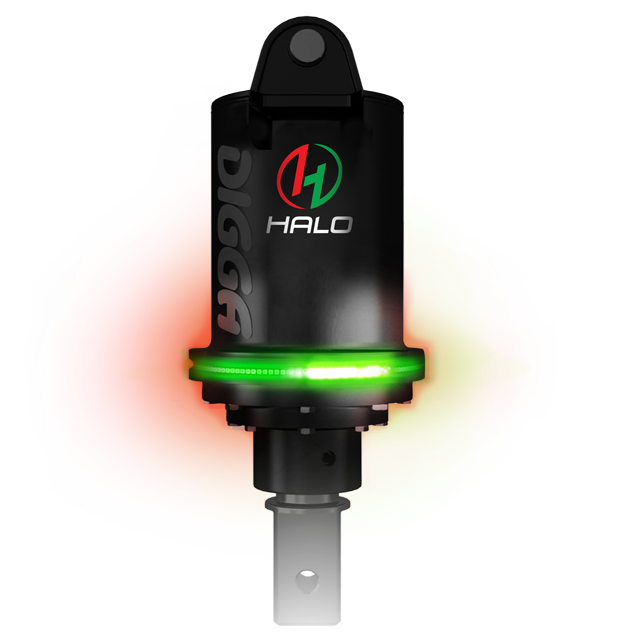
Specifications
Digga’s PD40 auger drive features an innovative design which allows the gearbox to lower into the hole to maximise drilling depth, without the need for extensions. This reduces downtime, minimises maintenance, and enhances productivity for greater returns. Equipped with a Danfoss motor, the PD40 is engineered for reliable performance in a variety of ground conditions.
| Machine Size Suitability | Up to 27T |
| Recommended Flow | 120lpm - 230lpm |
| Maximum Torque | 33,041Nm |
| Pressure Valve | Included |
| Recommended Auger | A8 / RC8 / RC10 / RC11 / DR11 |
| Maximum Auger Diameter (Clay / Shale) | 1500mm |
| Overall Length | 1152mm |
| Diameter | 355mm |
| Weight (Without Frame / Hitch) | 300kg |
| Standard Output Shaft | 100mm Square |
| Energy Control Valve | Optional |
| Case Drain Recommended | Not Required |
| Maximum Pressure | 240bar at 130lpm |
| Maximum Flow | 230lpm at 130bar |
| Maximum Power | 50Kw (67hp) |
| Swing Control | Optional |
| Diggalign | Optional |
| Halo Available | Optional |
A8 Auger
Bladed TeethRC8 Auger
Tapered TeethRC10 Auger
Tapered TeethRC11 Auger
Tapered TeethDR11 Auger
Rotating Rock PicksXT75HD (Inner) & XO75HD (Outer) Auger extensions
Digga’s HD series auger extensions are designed to help you drill deeper holes quickly and efficiently. Manufactured in-house, they are available in a variety of lengths in both inner and outer configurations, making them a versatile addition to your drilling capabilities. By pairing an inner and outer extension, you can double (or more) your drilling depth ability, without aversively impacting your storage capability, as they can be conveniently stored, one inside the other, to save on valuable space inside your truck or trailer.
The XT75HD & XO75HD range of extensions is suited for machines up to 20 tonnes.
Specifications
Maximum Torque: 23000Nm
Standard Hub: 75mm Square
Body (Diameter x Wall): 141mm x 10mm / 75mm Solid
Lengths: 1000 / 1500 / 2000 / 2500 / 3000 / 3500 / 4000 / 4500 / 5000mm
XT100 (Inner) & XO100 (Outer) / XO100HD Auger extensions
Digga’s drilling extension range for RC11 augers provide the ultimate in quality. Our extensions are manufactured in-house by Digga using only the highest grade materials and strictest quality control. The XT-XO / XOHD range of extensions is suited for machines up to 50 tonnes.
Specifications
Maximum Torque: 40000Nm (XT-XO) / 95000 (XOHD)
Standard Hub: 100mm Square
Body (Diameter x Wall): 168mm x 11mm / 100mm Square Solid (XO-XT) / 219mm x 12.7mm (XOHD)
Lengths: 1000 / 1500 / 2000 / 2500 / 3000 / 3500 / 4000mm
MY.DIGGA.COM
Everything you need to know about your Digga attachment, including: operators manuals, safety information, risk assessments, electrical guides, maintenance, tips and how- to’s as well as related information where applicable. With a user-friendly interface and easy navigation, you can instantly find the support you need.
LEARN MORE ABOUT AUGERS
From understanding the different types of augers available, to learning about components and maintenance, we hope you find this information helpful.
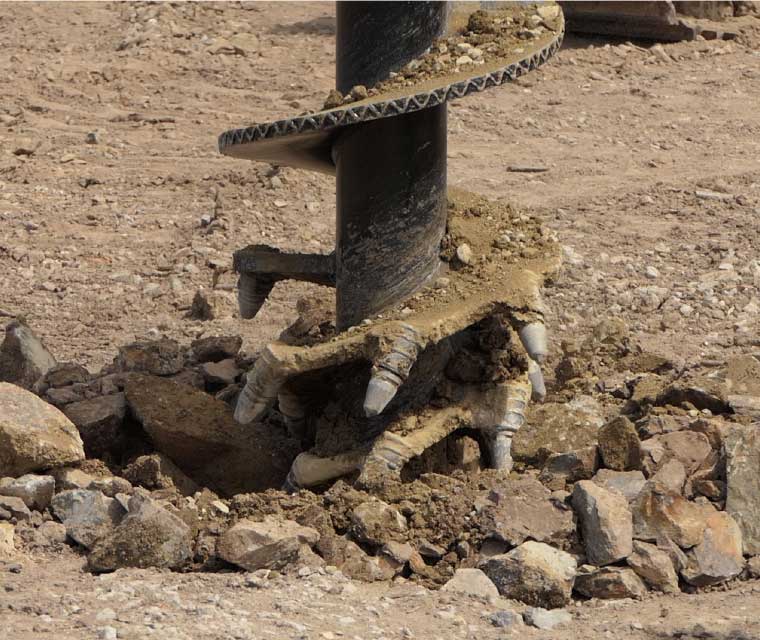
FREQUENTLY ASKED QUESTIONS [FAQS]
What earth drill best suits my machine?
General rule of thumb would be that your machine weight matches the model code of the earth drill.
i.e. 2 Tonne Machine – PDX2, 3 Tonne – PD3, 5 Tonne – PD5, etc., etc...
Your application and expectation would be the next governing factor.
i.e. For a 5 Tonne machine
The standard model reference of PD5 would best suit augering in general conditions of soil, clay, shale up to approx. 900mm.
Should your main drilling requirement only be for softer ground conditions with smaller diameter augers, e.g. sand and soil with augers up to 600mm dia., then you may consider stepping down a model size to a PD4-5, (-5 denotes 75mm Square Output Shaft to match the recommended Type 6 Auger Bits). This step down in model will give you more auger speed while still maintaining enough power to cope with the down-pressure of the 5 Tonne machine.
Likewise, if your application requires larger dia. holes or harder condition, i.e. rock, then stepping up a model or two, PD6 or PD7 may best suit these applications.
What is the biggest earth drill I can put on my machine?
There is a several factors that are at play when suiting up “The Biggest earth drill” consideration needs to be given to:
- Lift capacity of the host machine: should the weight of the drill exceed the SWL (safe Working Load) of the host machine then the drive should not be fitted.
- Ground clearance: Careful consideration needs to be given to insure there is ample ground clearance under the pickup of the host machine when both the drive and drilling tool or Screw Pile are fitted.
- Application Overview: When selecting the largest drive, it's essential to consider both the desired outcome and the specific job requirements. These factors will significantly influence the choice of the appropriate drill.
What happens if put the wrong drive on my machine?
If you install the wrong planetary earth drill on your machine, several issues could arise, potentially affecting performance, safety, and the longevity of both the drive and the machine:
- Incorrect Torque and Speed: The earth drill may not be suited to the hydraulic flow and pressure of your machine. This can result in too much or too little torque, either leading to inefficient digging or overstressing the drive components leading to frailer.
- Reduced Efficiency: The wrong drill might not be optimized for your specific drilling conditions, causing slower digging and increased wear on the auger teeth and pilot, leading to more frequent maintenance.
- Hydraulic System Strain: Using an incompatible drive could place excessive strain on your machine's hydraulic system, potentially causing overheating or damage to pumps, hoses, and other components.
- Poor Performance: If theearth drill is mismatched, it may not provide the required torque or rotational speed for your ground conditions, leading to subpar hole performance, especially in difficult ground.
- Increased Wear and Tear: An incorrect drive can accelerate wear on both the drill and the auger, leading to more frequent breakdowns or even failure, which can be costly and time-consuming to repair.
- Safety Hazards: A mismatched drive may cause unexpected behaviour, such as uncontrolled movements or failure under load, which could create a safety risk to operators, bystanders and equipment.
For optimal performance and safety, it's crucial to match the earth drill to your machine's specifications and the ground conditions you are working in.
What are the advantages of a 2-speed earth drill?
A 2-speed drill offers enhanced versatility and efficiency for drilling applications by providing two selectable speed ranges:
- High Torque (Low Speed): This setting is ideal for drilling through hard, compacted ground, clay, or rock. It delivers maximum torque, allowing the auger to cut through tougher materials with greater force, though at a slower speed.
- High Speed (Low Torque): This setting is suited for softer soils, such as sand or loam, where high torque isn't necessary. It allows for faster drilling, increasing productivity by completing holes more quickly in easier ground conditions.
Benefits of a 2-Speed Drive:
- Versatility: Allows you to switch between speed and torque depending on the ground conditions, making it suitable for a wide variety of drilling environments.
- Efficiency: Saves time and wear on equipment by using the appropriate speed and torque for each specific task.
- Enhanced Versatility and Performance: Engineered to handle both hard and soft soils, this design allows for the integration of a larger reduction gearbox, delivering increased torque without compromising speed. Enjoy the performance benefits of two earth drills in one, eliminating the need for equipment changes and significantly boosting overall job efficiency.
In short, a 2-speed drill offers greater diversity, control, and adaptability, ensuring optimal performance and productivity across different drilling conditions.
Can one earth drill fit both my machines?
It is possible to get an earth drill that can be used with two different size machines, but it will depend on the specific earth drill and the machines you have. If your two machines are close in size, for example a 5t and 10t or 15t and 20t but the drill must be suited to the larger machine, it is not feasible should you have a 3t and 20t machine as the physical size of the drive for the 20t machine is far too large for the 3t machine and the performance output would be inadequate to perform normal drilling.
Some earth drills are designed to be used with a range of different machines and may come with adaptors or other attachments that allow them to be used with different sizes of equipment. However, it's important to check the specifications of the earth drill and the machines you must ensure that they are compatible.
Additionally, it's important to consider the power and torque of the machines, and the size and weight of the earth drill. A larger or heavier earth drill may require a more powerful machine to operate, and a smaller machine may not be able to handle the weight and torque of the earth drill.
It's important to consult with the manufacturer or a professional before deciding, and to check the compatibility and capacity of your machines with the earth drill you want to use.
The other option that is idea for this scenario of running one drive two machines is a two-speed drive (see 2- Speed high flow & 2-Speed STD flow).
Will my 1.0Tonne machine dill a 600mm Dia. hole in solid rock?
In general, we would have to say NO - For the following reasons:
- Without knowing the grade of rock, e.g. for sandstone there are 5 grades, 1 – being soft and weathered, classed as drillable, and 5 – being extremely hard and classed as un-drillable.
- The physical downforce of your machine will not carry enough weight to functionally drill this diametre. hole in rock.
What is the difference between a PD5, PD6 & PD7?
There are several differences between a PD5 & PD6, PD7
The main is the amount of torque outputted by each individual unit PD5 Max. Nominal Torque @ 240bar Pressure is 5000 Nm., PD6 – 5,500 Nm & PD7 – 6,000 nm.
With each increment in increase of torque you have an equal decrease in output shaft speed when inputting the same amount of flow (Lpm or Gpm).
Additional differences between the PD5 and the PD6 & PD7 is the gearset of a PD5 has a Series 2 Gearset where the PD6 & PD7 have a series 4. This difference is in the thickness of the gearsets in each. These differences are there to cope with the increasing weight of the parent machine and for the increase in torque capabilities.
Also, there is a marked difference in the bearings size of the PD6 & 7 over the PD5. The increase in size of the bearings in the PD6 & 7 is to cope with the increase in weight from the parent/host machine.
What is better, Round, Square or Hex Shaft?
Depending on the torque output of the drive unit we would recommend a square or hexagonal shaft for all drives over 4,500 Nm. For drives under this torque rating a 65mm Rnd as standard relies on the auger pin to bare the rotational load of the drive unit. This pin is rated to 10Knm but with our safety factor we like to step up to Sq or hex for torques higher. By using sq. or hex we are supporting the rotational load of the drive on the four side of the square or the 6 sides of the hex.
Why does my earth drill need servicing?
The gearbox of earth drills sit in their own bath of oil. The gearbox is not lubricated by the machines hydraulic oil, as a result the oil needs regular changes similar to your car.
Service intervals are outlined in the operator’s manual provided with all Digga attachments. The recommended intervals depend on the intensity of use, ranging from occasional to extreme. For best practices, consult the manual to determine the appropriate maintenance schedule based on your specific usage.
Regular servicing is essential to maintain performance and extend the life of your equipment as well as your warranty.
What oil do I use in the gearbox?
Depending upon the earth drill model being used and its application with determine the type of oil to be used, but in all drive, we recommend using and “EP” (Extreme Pressure) oil this will ensure longevity of your gearbox. Typically, your drills will come from factory filled with:
- ISO EP320 Mineral Oil ... for PDD to PD50 including 2 Speed drives
- ISO EP320 Synthetic oil ... for SD, MD, UD, XD drives
Note : if unsure please contact the Digga Service department for guidance
Can I fit HALO on a competitor's earth drill?
You can't use the Digga HALO system on non-Digga earth drills because the HALO system is specifically designed and engineered to suit Digga earth drills.
Here are some key reasons:
- Compatibility: The HALO alignment system is built to integrate seamlessly with Digga drills, ensuring correct fitment and performance. Competitor earth drills may have different dimensions, or operational requirements that aren't compatible with the HALO system.
- Calibration: HALO uses 6 sensors to provide real-time feedback on the auger’s angle for precise drilling. These sensors are calibrated to work specifically with Digga’s drills and control systems.
- Warranty and Support: Digga products, including the HALO system, are covered under specific warranties when used with compatible Digga components. Installing HALO on a non-Digga drive will void warranties,
